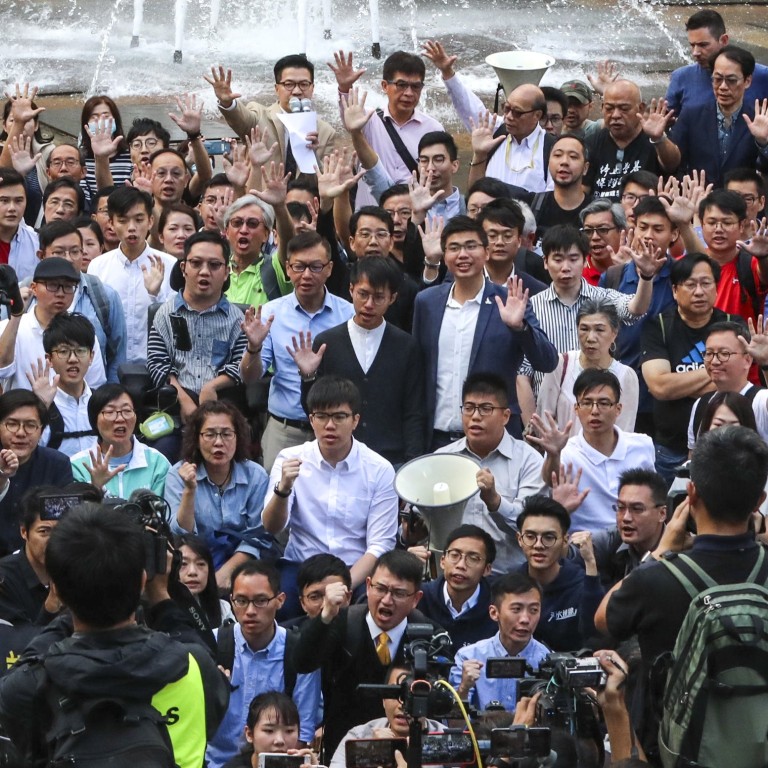
Hong Kong elections: pan-democrats celebrating landslide win vow to keep up pressure on city’s beleaguered leader to address protesters’ demands
- Democratic Party leader says election is first step on a long road to full democracy, while Chief Executive Carrie Lam acknowledges that the people have spoken
- China’s foreign ministry declares resolute backing for Lam administration, while pro-establishment camp comes to terms with heavy defeat
Hong Kong’s opposition pan-democrats celebrated their landslide victory at Sunday’s historic district council polls by vowing to keep up the pressure on the government to bow to protesters’ demands, while their humiliated pro-Beijing rivals were left reeling from their shock defeat.
Of the 452 seats up for grabs, the pro-democracy camp netted 392 – comprising 347 pan-democrats and 45 independents who are friendly with the camp. The pro-establishment camp had to settle for the remaining 60.
Democrats also took control of 17 out of 18 district councils. They won all elected seats in Wong Tai Sin and Tai Po district councils. The only council held by the pro-establishment camp was the 18-member Islands district, where eight seats were handed out automatically to pro-establishment rural chiefs.
The dramatically changed electoral landscape was a mirror image of four years ago when the pan-democrats won only 116 seats, while the pro-establishment camp bagged 292 seats, taking control of all 18 district councils.
Wu Chi-wai, leader of the Democratic Party, one of the biggest winners, called the election the first step on a long road to full democracy. “This district election shows that the central government needs to face the demands of a democratic system,” he said.
The city’s embattled leader, Carrie Lam Cheng Yuet-ngor, issued a statement acknowledging that the people had spoken. She conceded there was a view the results reflected the people’s dissatisfaction with the current situation and the deep-seated problems in society.
“The government will certainly listen humbly to citizens’ opinions and reflect on them seriously,” she said, without elaborating on her next steps.
The people have spoken – Carrie Lam must now respond in order to end crisis
She must choose whether to mend fences with her allies in the pro-Beijing camp or the victorious pan-democrats who used the elections as a referendum on the protest movement that had rocked the city over the past six months.
With Lam’s pro-Beijing allies wallowing in defeat and a triumphant pro-democracy alliance eager to block her at every turn ahead of Legislative Council elections next September, analysts said Lam’s administration was effectively a lame duck government unless it could pull off real reforms or find a way out of the protest impasse.
On Monday, China’s foreign ministry spokesman, Geng Shuang, said during a regular briefing that the central government resolutely supported Lam’s leadership and that it also backed the police and judiciary in Hong Kong in “punishing relevant violent and illegal behaviours”.
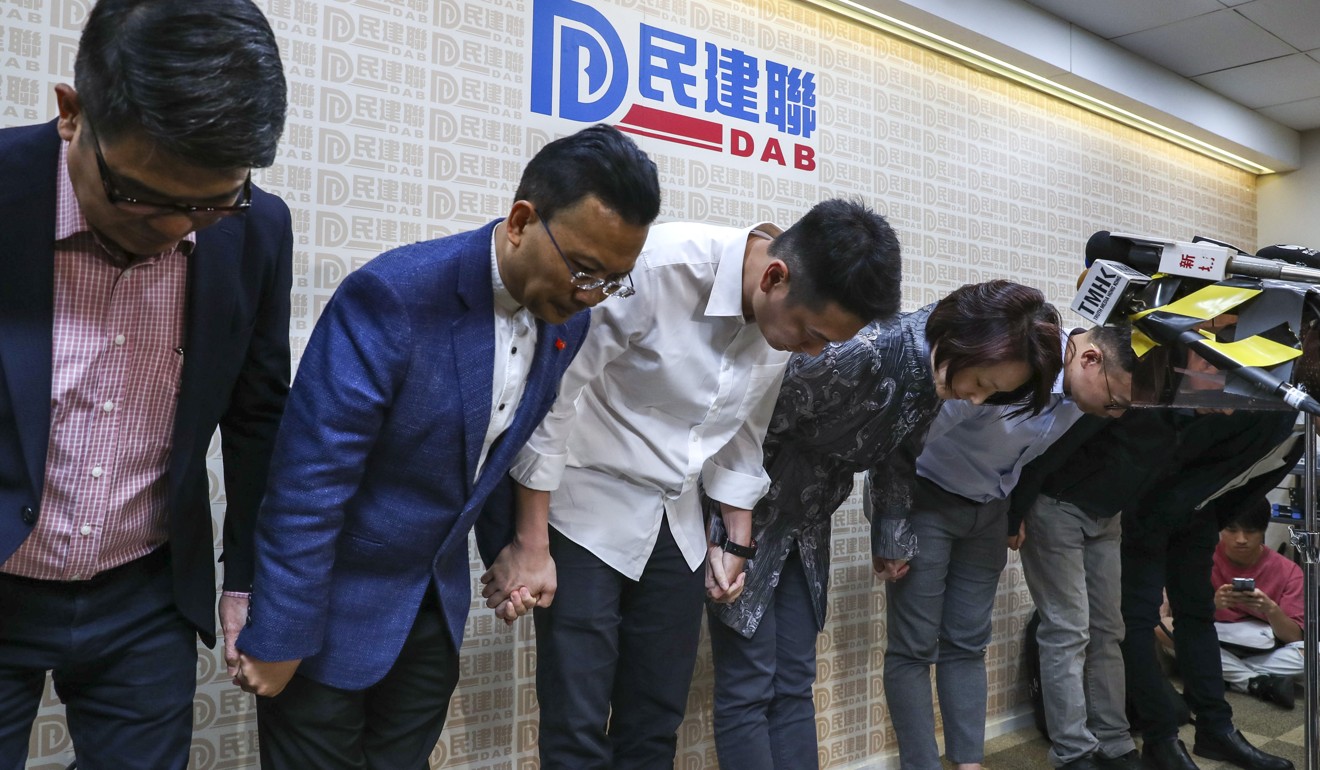
“The Chinese government’s resolve to protect national sovereignty, security and development interest has not faltered. Its resolve to carry out one country, two systems has not faltered,” he said.
Lam’s key ally and the city’s largest pro-establishment party, the Democratic Alliance for the Betterment and Progress of Hong Kong (DAB), which had 117 seats before the election, and fielded 181 candidates, won just a meagre 21 seats.
Time to concede to save Hong Kong
Chairman Starry Lee Wai-king bowed with senior colleagues and offered her resignation, but it was refused – no doubt because no willing successor was waiting to step into the role, given the party’s blistering defeat.
Among 13 pro-establishment lawmakers who sought another term as district councillors, only four were re-elected.
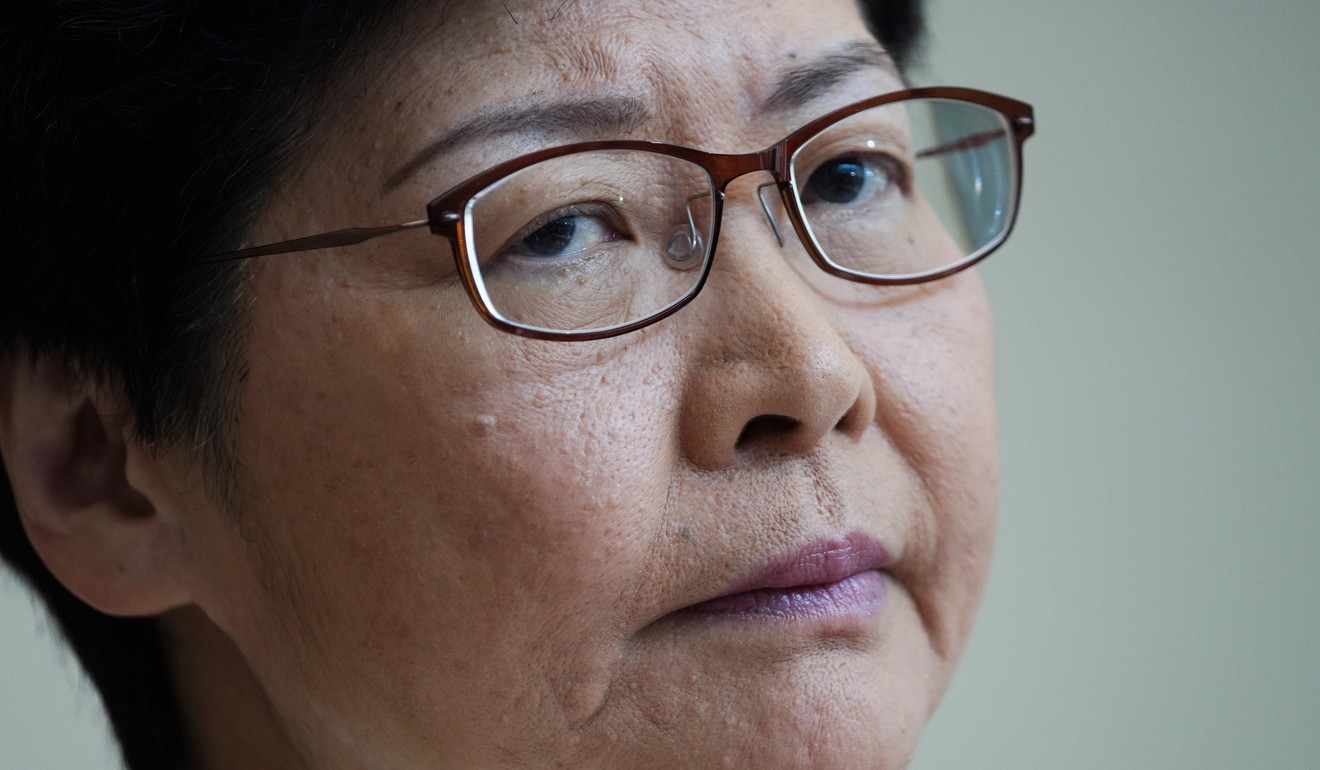
In the pan-democratic camp, the Democratic Party more than doubled its seats, from 43 to 91, while the Civic Party’s tally tripled from 10 to 32. They are now the two largest parties in the district councils, the lowest tier of government dealing with municipal matters but able to control resources and have greater influence in Legislative Council elections.
Youthful, fresh-faced candidates, many active in the anti-government protests roiling the city over the past six months, were among the notable winners in the elections, which saw a record turnout of 2.94 million voters, or 71.2 per cent of the vote, up from 47 per cent in 2015.
Beijing tries to brush off Hong Kong election, blames foreign meddling
However, even as the pro-democracy camp’s share of the seats surged to 87 per cent, and the pro-establishment bloc appeared all but obliterated, a closer look at the vote share suggested no significant shift had occurred in the traditional split between the two sides.
The pro-democracy camp garnered a total of 1.6 million votes, or 55 per cent of the ballot box; while the pro-establishment camp had 1.2 million votes, or 41 per cent. The remaining 4 per cent went to non-affiliated independents.
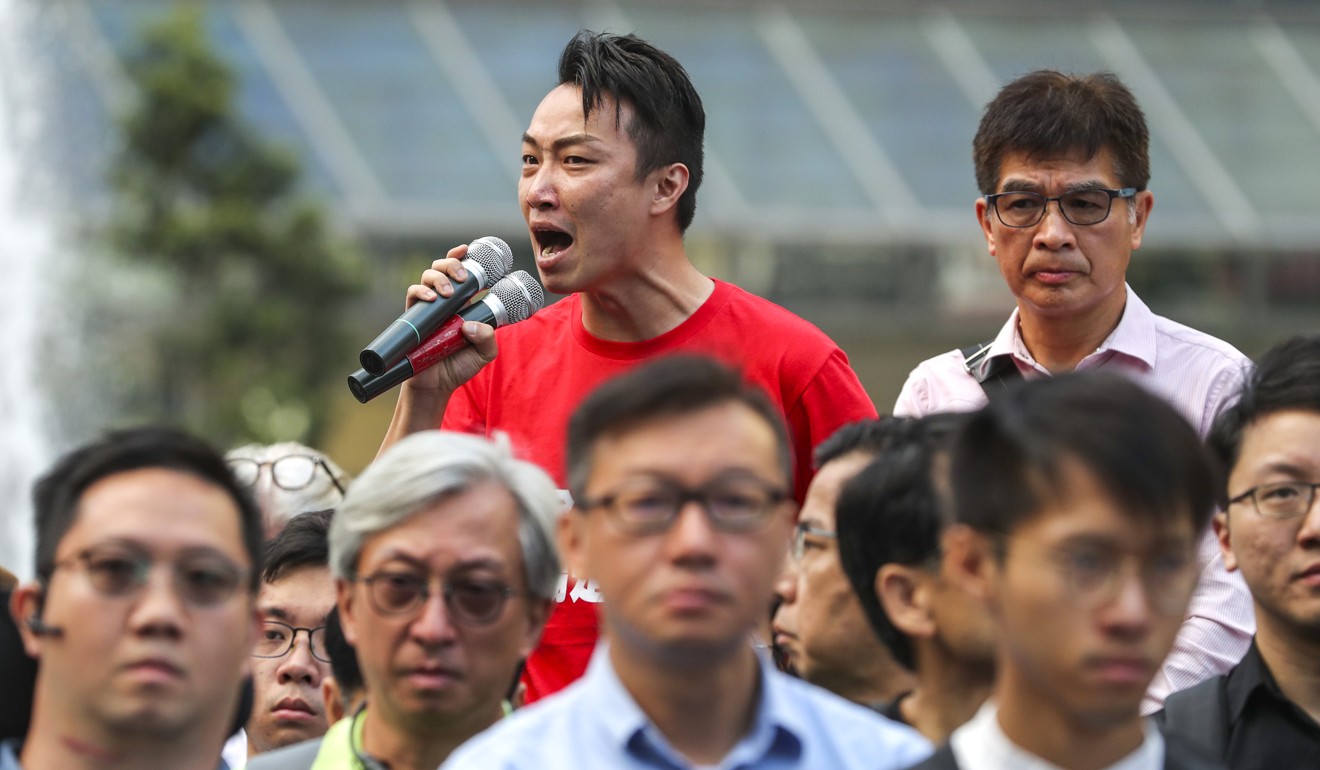
Analysts said the results were a clear message that voters were discontented with the way Lam’s administration had been governing the city and relying on police to go after protesters rather than seeking another way out amid the increasingly violent protests that had gripped Hong Kong since June.
Political scientist Dr Ma Ngok, of Chinese University, described the results as “surreal”.
“Hongkongers have sent a resounding and clear message to the government that they support the social movement and there isn’t any change of public opinion,” he said.
Jimmy Sham Tsz-kit, convenor of the Civil Human Rights Front which has been organising large-scale anti-government rallies since June, said Lam must not shy away from responding to what the voters were telling her.
Hong Kong election result draws cautious response from China
“It is time for the government to address our five demands,” said Sham, referring to protesters’ calls, which include an independent probe into police’s handling of protests and the implementation of universal suffrage.
The activist won in Lek Yuen constituency.
At least three student leaders, who co-led the pro-democracy Occupy movement in 2014, were successfully returned as district councillors in their maiden electoral bids.
In the run-up to the elections, several pro-Beijing lawmakers called for the “silent majority” in Hong Kong to vote for pro-establishment candidates, to register their disapproval of the chaos.
But political scientist Dr Samson Yuen Wai-hei of Lingnan University said the election results suggested the notion was “wishful thinking”.
“The pan-democratic camp said this election would be a referendum on protesters’ demands, and it worked, but the pro-establishment, as a camp, did not call it a referendum,” Yuen said.
Analysts also believed that as nearly 400 pro-democracy activists take office on January 1 next year, they will be receiving official funding and resources, not just to improve the environment of their constituencies, but also to build their bases and fend off the government’s unpopular district programmes.
“In the past, all 18 District Councils always held a stance in support of the government, where they could ignore the majority opinion,” said Democratic Party leader Wu. “If we pass a joint resolution in each district, that will put huge pressure on the government.”
Each district also has an annual budget of about HK$30million to HK$40million (US$3.8 million to US$5.1 million) to spend on infrastructure and amenities to be allocated, he added.
District council winners pledge to focus on residents’ needs
Each councillor also had a monthly allowance of about HK$45,000 (US$5,750) for other needs.
Referring to Polytechnic University, where a dwindling number of radical students continued to be holed up, Civic Party chairman and ex-lawmaker Alan Leong Kah-kit also said: “The voice coming from the ballot box is loud and clear: we want Carrie Lam to withdraw police from PolyU.”
The university had been the site of extremely violent clashes between protesters and police last weekend, before the force surrounded it. Radicals had either escaped or surrendered over the past week, even as an estimated 30 were believed still to be there.
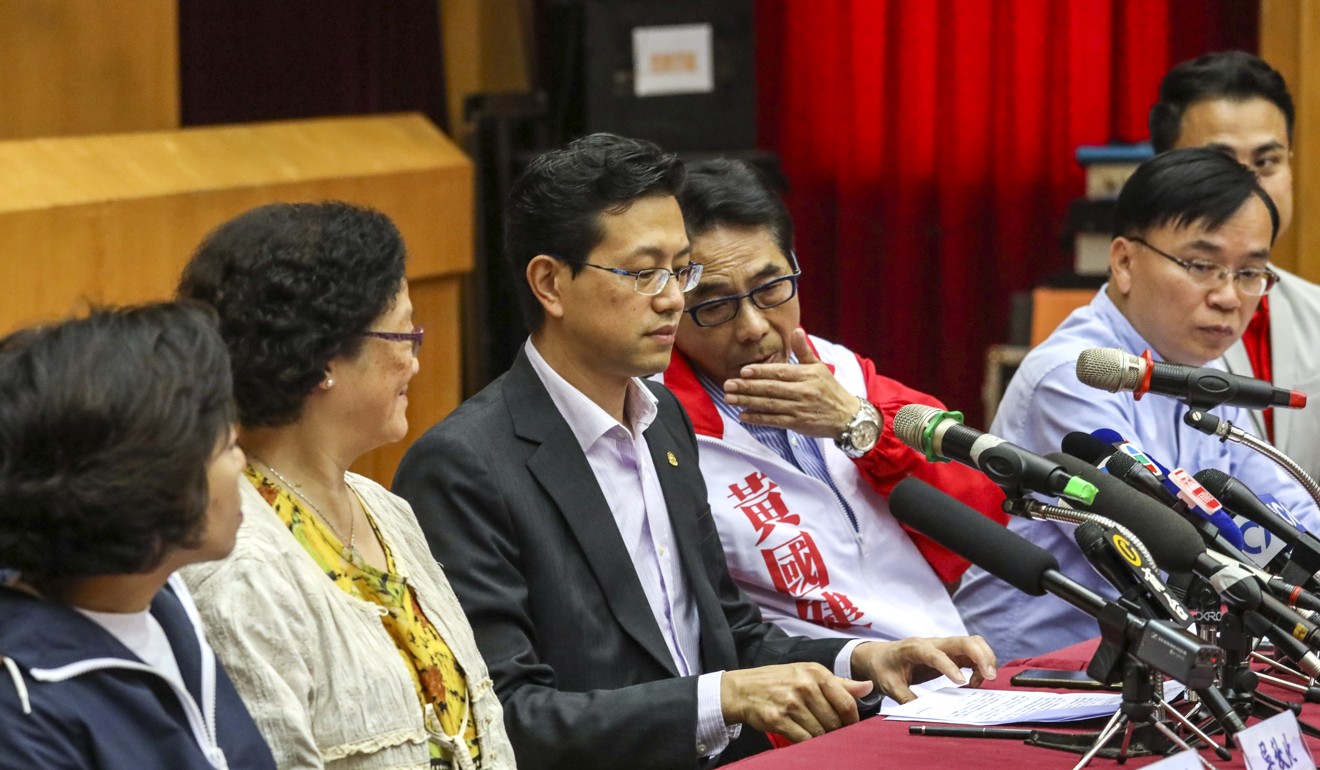
Last evening, a group of pan-democrats went to the campus to seek them out and persuade them to leave.
Leong also said of Lam’s government: “We want the current administration to consider resignation, from the top down to all politically accountable secretaries and Executive Council members.”
On the other side of the political divide, DAB chairwoman Starry Lee also called on the embattled government to deeply reflect on its work in restoring law and order. But she sidestepped questions on the groups’ future relations.
“Drastic changes have appeared in the city for the past five months … We understand that the public is discontented with the situation and worried about the future,” she said.
Pro-Beijing camp’s landslide loss ‘a chance for reflection’ on Hong Kong
Now with the pan-democrats winning the majority at the district councils, the landslide results are set to drag the pro-Beijing camp’s performance down in the next Legislative Council elections in September 2020.
The district councillors are eligible to run for one of five “super seats” in the legislature’s functional constituencies, but as the DAB now only has 21 district council seats, they are limited to fielding one “super seat” candidate in the next election.
There are also 117 seats for district councillors in the 1,200-member Election Committee, which elects the city’s leader every five years.
In 2016, 300 professionals and politicians from the pro-democracy camp won seats on the election committee, but they failed to win any of the 117 district council seats.
Now, the pro-democracy bloc stands a strong chance of being the power broker in the election of the next chief executive in March 2022.

